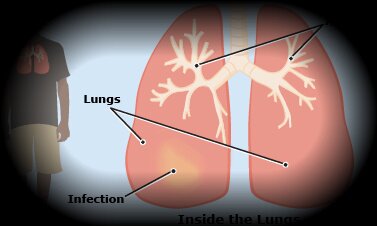Bacterial Pneumonia is definitely caused by gram-positive stain bacteria such as streptococcus pneumonia and staphylococcus aureus. These bacteria are commonly found in the upper respiratory tract. When inhaled, these bacteria will continually go through the alveoli until it clogs the pores.
When this happens, the defense system of our body will signal its armies, the neutrophils, to combat these invaders. While in its process of killing the bacteria, neutrophils release cytokines that activates the body’s immune system. Symptoms like fever, chills and body malaise felt during the intense stage of bacterial pneumonia are among the signs that our body is fighting the infection.
There are some myths that may relate to pneumonia. Others believe that you can catch pneumonia by not dressing properly in a cold weather. This belief is debunked because the only proven mode of transmission of pneumonia is through the inhalation of infected air droplets from someone.
Since it is a respiratory ailment, the body’s capability of exchanging oxygen and carbon monoxide is altered. This condition will result to easy fatigability and difficulty in breathing. It sounds easy but bacteria can travel from the lungs to the blood vessels. It may then cause septic shock.
This condition may damage the vital organs of the body such as kidneys, brain and heart. To combat these complications, physicians advise individuals who are diagnosed with bacterial pneumonia to seek medical advice instead of self medication.
Obviously, what the doctor will give is an antibiotic that can kill gram-positive bacteria. However, most doctors consider a lot of factors before prescribing a drug. The severity and the frequency of the infection are among the most considered by the doctors.

Because most severe cases of bacterial pneumonia are linked to drug resistance, doctors are very careful in giving antibiotics especially to individuals with a history of the said disease. Usually, the first line therapy is the administration of Amoxicillin via the intravenous route. In severe cases, Cefuroxime is given to patients.
The most common complain of individuals with pneumonia is difficulty in breathing. It resulted from the leakage of bacteria, neutrophils and fluids to the alveoli. Supportive therapy such as oxygen supplementation and is very helpful for the patient. In severe cases, artificial ventilation and intensive care may help patients recover from the ailment.
The best way to prevent Bacterial pneumonia is through vaccination. Currently, the available vaccines in the market are streptococcus pneumoniae and meningococcus. Pneumococcal conjugate vaccine for children and pneumococcal polysaccharide vaccine for adults are also available.
Is pneumonia contagious?
Pneumonia is an infection of the lungs. It is caused by various pathogens like bacteria, virus and fungi. People, especially concern mothers ask, “Is pneumonia contagious?” The answer to this question is yes – to an extent. Pneumonia is not contagious but the pathogens that are transmitted through airborne droplets cause the disease.
Pneumonia is an infection which characterizes lung inflammation. Since most pathogens originate in the upper respiratory tract, they are easily transmitted through airborne droplets when the infected person coughs, sings or talks.
The most affected individuals are those with impaired immune system and chronic disease. Individuals over 65 years old and children under 2 years old are also at risk to get pneumonia because of their unstable immune system.
To further answer the question, “Is pneumonia contagious?’ let’s discuss its signs and symptoms. The most present symptom of pneumonia is fever. In order to counterattack the infection, our body produces heat to kill the bacteria. It is considered one of the best defenses of our body to infection.
Another expected symptom is coughing. It is a defense mechanism of our body to expel foreign substances away. The latter symptom is also considered as one of the exit points of harmful pathogens to infect other individuals.
Pathogens stay in the secretions of infected individuals. This situation confuses others in terms of what is the real culprit of the spread of the disease. They often ask, “Is pneumonia contagious?” If you study things carefully, you would notice that pneumonia is just a disease condition caused by harmful pathogens such as bacteria, virus and fungi.
You may blame it to the pathogen and the unhygienic practices of the person but it is not the disease or the patient per se that cause pneumonia. However, you must understand that pneumonia can be transmitted through the inhalation of infected .
Wearing protective gears such as masks will alter its transmission. Another indication if the ailing person still harbors infected pathogens is the fever. If the fever subsides after three to four days of medication, it means that the infection has been managed.
Since pneumonia is mostly acquired in the community, the prevention of pneumonia should start from the health practices learned at home.
Children at their young age should be taught of proper health practices such as proper hand washing, proper coughing practices and proper exercise to boost the immune system. If someone asks you again, “Is pneumonia contagious?” you know the answer. Pneumonia is not contagious, only the pathogens that caused it.
Latest posts by admin (see all)
- Best Shampoo for Oily Hair: Causes, Prevention Tips and Review of Brands with Value - October 20, 2015
- Best Vitamins for Hair Growth: Reviews of the Brands Worth Buying - October 20, 2015
- Concept 2 Rowing Machine Reviews: Differences Between Model D and E - October 18, 2015

{ 0 comments… add one }